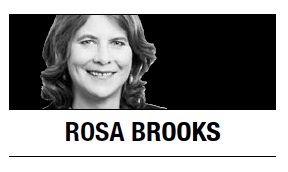
Be afraid! Even after weeks of missteps, polls suggest that more than a third of American voters still support Donald Trump. If Trump wins, expect to find him decorating the Oval Office with Hillary Clinton’s taxidermied head -- and expect to find me breaking rocks in a Trumpian labor and re-education camp along with all the rest of America’s journalists, its intellectuals, non-Christians, immigrants and people of color.
But though the Trumpocalypse remains a worrying possibility, there may yet be a silver lining here. In fact, Trump’s candidacy could still turn out to be very good thing for America -- as long as he loses in November -- because he is exposing the country’s divisions, problems and petty bigotries.
For years, the Republican Party has been, for all intents and purposes, the party of white America, but a thin patina of respect for diversity, coupled with the calculated deployment of superficially race-neutral code words, has long allowed Republican leaders to claim otherwise.
Trump did not create the racism so apparent at his campaign events, but his record, his words and his popularity have forced moderate Republicans to reckon with their party’s shameful legacy of courting a distinctly racist base.
I am not letting the Democratic Party off the hook, either. In recent decades the Democratic Party has done far more to address racial injustice than the Republican Party, but the Democrats have their own ignominious record of early opposition to desegregation, and the defection of so many working-class white male Democrats to the Trump camp suggests that nostalgia for the bad old days is more prevalent than party leaders care to acknowledge.
Trump’s candidacy has also pushed into the open something else elites in both parties would prefer to ignore: the pain and dislocation experienced by globalization’s have-nots. For decades, both Republican and Democratic leaders have sung the virtues of free trade and economic liberalism. But globalization’s benefits are distributed unevenly. In particular, rural Americans and less educated white males have been left behind.
Faced with a prevailing political narrative that lauds free trade as a rising tide that lifts all boats, it is little wonder that those who find themselves sinking are casting about for someone to blame, and finding convenient scapegoats in immigrants and minorities. We should denounce the racism and xenophobia on display at so many Trump events, even as we acknowledge the human fear and misery that fuels these toxic sentiments.
If Trump’s campaign is forcing an overdue acknowledgement of some unpleasant realities, it is also upending our ideas of “politics as usual.” In particular, Trump’s candidacy is shaking up settled assumptions about what it means to be liberal or conservative, left or right, Democrat or Republican.
American political discourse has had a frozen quality of late, with both parties seemingly locked in by simplistic stereotypes: Republicans are hawks and Democrats are doves; conservatives oppose gay marriage and liberals support abortion rights; the right is pro-business while the left wants to rein in Wall Street and redistribute the wealth.
Trump did not get the memo. His views on race, immigration, Islam, torture and guns seem to place him on the extreme right of the Republican Party – but his views on transgender rights, military interventions and Wall Street often seem more like those of a liberal Democrat. He defies categorization.
Granted, this is partly because he is not exactly consistent. He’s flip-flopped with dizzying regularity on abortion, tax rates for the wealthy, the minimum wage, whether to send troops to fight Islamic State group and a dozen other issues, so it is hard to know what Trump really believes, if anything.
None of this makes Trump a good person or a plausible leader. On the contrary: Trump’s willingness to legitimize racism and xenophobia should disqualify him from the presidency, as should the fact that his views seem entirely a matter of convenience rather than conscience.
Still, I am glad Trump’s brought so much nastiness to the surface, because you can’t fight what you cannot see. And the very unpredictability of his positions may create a new space in American politics, one in which candidates from both parties can break away from rigid ideological platforms and experiment more freely with policies and ideas.
Thanks, Donald. Now please, go away.
By Rosa Brooks
Rosa Brooks is a special contributor to the Los Angeles Times. -- Ed.
(Tribune Content Agency)








![[Weekender] Korea's traditional sauce culture gains global recognition](http://res.heraldm.com/phpwas/restmb_idxmake.php?idx=644&simg=/content/image/2024/11/21/20241121050153_0.jpg)